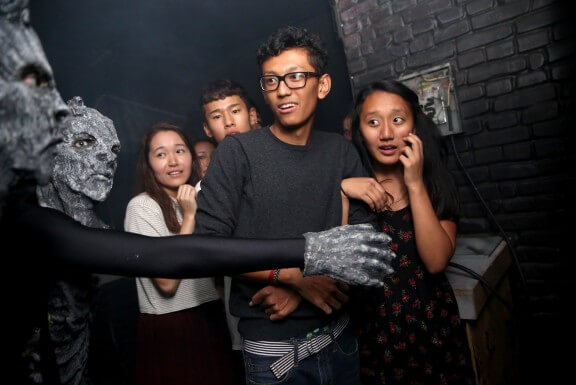 Caitlin Doughty encourages people to get to know the culture of death in their countries.
Caitlin Doughty encourages people to get to know the culture of death in their countries.
Credit: Darren Blackbird
She is the face of death.
From her hit YouTube series answering forbidden questions, to new “Death Salon” sessions helping people get over the fear, Los Angeles native Caitlin Doughty, 29, has rapidly become the vanguard of “death acceptance” — a new movement demanding more engagement with the great beyond.
Metro: How can I get to know death?
Doughty: There are many things you can do. First, make it a priority. Read all you can about death culture in your country and countries around the world. Watch films and documentaries about death. Go to cemeteries and just sit and meditate on how you are not a permanent fixture in this world.
Doing these things is not morbid or weird, I promise, it’s following an incredibly natural curiosity. Most importantly, go to funerals of the people you know and love. Don’t skip them just because death freaks you out. Nothing is a better cure for death fear than rational exposure to real mortality.
What does a poor relationship with death look like, and what is the effect on life?
It looks like lot like modern culture. We always want more than the person next to us, to be more successful, have more money, get more likes on Facebook. These things distract us from the fact that we are animals that are doomed to die, just like every other creature on Earth. Humans want to feel special and not admit that we are these ephemeral creatures. It’s understandable, but the denial hurts our relationship with reality.
How far do you believe is it possible for someone to be reconciled with death?
I believe no one ever totally, 100 percent accepts it. There are fleeting moments where I feel like I do, but I only need to think about the death of my good friends, or who will take care of my cat if I die, and doubt sets back in. But the more you run these scenarios through your mind in a sensible way, the easier it becomes. The moments of fear pass much faster, and your ability to face any of life’s harsher facts becomes stronger.
Tell us about the death acceptance movement.
I think it’s very significant, but that’s probably because I’m in the thick of it; of course I’m going to think it’s the most important damn thing in the world. But I would also argue that our relationship with death is broken, and the stakes in fixing it pretty high. The sheer number of people interested in collaborating or participating in bringing death, dying and alternative funeral options into the mainstream has increased so much in even the past few years I can’t help but believe it is working. The movement is for anyone who takes issue with the way we currently deny death in our funeral and medical system.
What is the main opposition you face?
The more traditional funeral system has a financial interest in keeping things the way they are now, selling their services, embalming, caskets, vaults, etc. It’s not in their best interest to see the family take a more active role in caring for the dead body or planning the funeral. That’s not true of everyone in the industry, it’s important to note. The funeral directors who want change and alternatives are growing every day.
Denial is also a big obstacle. If people are refusing to talk about their death, refusing to create advance directives for their health care or wills for their estate, we will continue to have a messy end-of-life experience.
I read that you would choose putrefaction (open air decomposition). Why should our readers explore alternative after-death plans?
I absolutely choose putrefaction. I believe that we have our atoms on loan for a certain amount of time while we’re alive, and then we have to give them back when we die. To try to preserve the body against decomposition, what it’s naturally designed to do, is to have a difficult relationship with your own death. Exploring alternatives allows people to really think about what they want for their bodies post mortem and the method that makes them the most comfortable with dying. Is it going up in a blaze of glory in cremation, is it returning to the earth, is it being scattered at sea? What is it that brings you comfort?
How does it feel to be perhaps the most famous “face of death”?
I don’t know if that’s true, but if it is, it’s probably because no one else is applying for that position! I try to be rational and humorous, so if people think of me when they think of death, the Grim Reaper is my goofy face saying, “Hey guys! It’s going to be OK! Death is natural! Have a great day!”
Does Halloween exasperate you?
Halloween is fun. Do I wish more people knew the history of how it originated as a Celtic festival blurring the line between the living and the dead? Absolutely, because that angle makes the whole thing so much more interesting than just sexy costumes. But I’m not going to hate, dressing up and eating chocolate are two pretty satisfying activities.

















